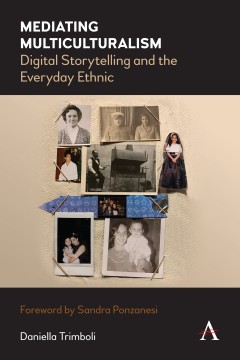Mediating Multiculturalism
Digital Storytelling and the Everyday Ethnic
By Daniella Trimboli
Foreword by Sandra Ponzanesi
Anthem Series in Citizenship and National Identities
Anthem Series on Global Migration in the Asia-Pacific Region
- About This Book
- Reviews
- Author Information
- Series
- Table of Contents
- Links
- Podcasts
About This Book
Multiculturalism has been a topic of scholarly exploration for almost fifty years. Most recently, these explorations have sought to respond to growing public sentiment that the multicultural ideal, borne out of Western liberalism, has failed. Indeed, ‘multiculturalism is dead’ has been a popular catch cry in Anglo- and Western-European countries for the past decade. Significantly, the continued discussion about the success or otherwise of multiculturalism registers the topic as alive as ever (albeit in a mode of crisis) and one that shows no signs of disappearing.
There are currently two main scholarly approaches to the so-called crisis of multiculturalism. The first approach retains the importance of multiculturalism by inflating and promoting its positive attributes. The second approach problematizes multiculturalism by retexturing its meaning and attempting to reconnect its political/theoretical domain with its ordinary manifestations. In some instances, the second approach renounces the concept of multiculturalism altogether, positioning it as a past phenomenon. Both approaches frequently mirror broader trends in cultural studies and artistic domains by turning to ‘the everyday’, using on-the-ground experiences as a tool to redefine the meaning of multiculturalism. But what work is done in the name of the everyday? Is ‘the everyday’ really a sanctioned, authentic space where cultural difference exists beyond the State? These are questions that neither approach takes seriously nor appropriately addresses.
This modern book addresses this oversight by taking the everyday of everyday multiculturalism to task and doing so via the increasingly popular and everyday medium: digital storytelling. The ‘digital’ is an important node of analysis, not only because it has so far been overlooked in studies of everyday multiculturalism, but because its immateriality often affords it a distance from critical analyses pertaining to material effects. This book forefronts the materiality of digital storytelling by closely considering how the genre enables racialization to manifest at the level of the body. How does the genre compel the creators of digital stories to embody and/or reject racialized structures associated with concepts of multiculturalism? What do these stories tell us about the way multiculturalism is mediated and, importantly, how it might be re-mediated?
As we enter an era of unprecedented global mobility, discussions pertaining to cultural difference and the systems used to negotiate it become more frequent and more complex. This book makes a timely intervention into these discussions to both consolidate and reimagine the rocky terrain of multiculturalism, providing a valuable resource for scholars in cultural studies, media and internet studies, and ethnic and race studies. Additionally, the book provides a foundation for rethinking digital narrative production pertaining to cultural difference, giving it a practical purpose for educators and digital practitioners alike.
Reviews
‘Trimboli demonstrates how everyday multicultural digital artworks are able to leap beyond the contradictions inherent in focusing on cultural difference to approach Australian storytelling as though for the first time.’ —Sneja Gunew, FRSC, Professor Emerita, Department of English Language and Literatures/Social Justice Institute, University of British Columbia, Canada
‘Daniella Trimboli gives us both an intimate portrayal and a sharp analytics of the Australian world of multicultural digital storytelling. But she also uses this field to stage an encounter between Australian writings on multiculturalism and global critical social theory. What we end up with is one of the most astute, critical and scholarly investigations of multiculturalism I have read.’ —Ghassan Hage, Professor of Anthropology and Social Theory, School of Social and Political Science, University of Melbourne, Australia
‘Mediating Multiculturalism brings together an incisive exploration of theoretical ideas and rich case studies to offer an original analysis of the intersection of digital storytelling and multiculturalism. Trimboli’s examination of the complexities in this relationship provides an innovative approach to the critical, cosmopolitan possibilities of creative digital interventions.’ —Greg Noble, Professor, Institute for Culture and Society, Western Sydney University, Australia
Author Information
Daniella Trimboli is a postdoctoral research fellow in cultural studies at the Alfred Deakin Institute for Citizenship and Globalisation, Deakin University. She is an associate editor of the Journal of Intercultural Studies.
Series
Anthem Series in Citizenship and National Identities
Anthem Series on Global Migration in the Asia-Pacific Region
Table of Contents
List of Figures; Foreword by Sandra Ponzanesi; Acknowledgements; Introduction: Multiculturalism as a Crisis of Contradiction; Part One Convergences; Chapter One Difference Returns to the Everyday: Multiculturalism, the Arts and ‘Race’; Chapter Two Digital Storytelling and Diversity Work; Chapter Three Meeting in the Middle: A Theoretical Framework; Part Two Multicultural Bodies; Chapter Four Everyday Ethnicity in Digital Publics; Chapter Five Harmonising Diverse Voices: Ethnic Performativity in Collaborative Digital Storytelling; Chapter Six In Pursuit of the Promise; Chapter Seven The Heart of the Matter; Chapter Eight Slipping Up: Performative Glitches; Part Three Future Digital Multiculturalisms; Chapter Nine Diasporic Disturbances: Alternative Digital Storytelling Techniques; Chapter Ten The Cosmos in the Everyday; Chapter Eleven Digital Cosmopolitanisms, Diasporic Intimacies; Conclusion: Remediating Multiculturalism; References; Index.
Links
Stay Updated
Information
Latest Tweets



